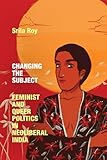Changing The Subject : Feminist and Queer Politics in Neoliberal India / Srila Roy.
Series: Next wave (Duke University Press)Publisher: Durham : Duke University Press, 2022Description: pages cmContent type:- text
- unmediated
- volume
- 9781478016243
- 9781478018889
- 305.420954 ROY 23/eng/20220307
- HQ1240.5.I4 R69 2022
- SOC028000 | HIS017000
| Item type | Current library | Shelving location | Call number | Status | Date due | Barcode |
|---|---|---|---|---|---|---|
 BOOKs
BOOKs
|
National Law School | Anthropology Section | 305.420954 ROY (Browse shelf(Opens below)) | Pending hold | 38930 |
Includes bibliographical references and index.
Introduction: Changing the subject of Indian feminism;
Indian feminism in the new millennium : co-option, entanglement, intersection;
Queer activism as governmentality : regulating lesbians, making queer;
Queer self-fashioning : in, out, and beyond the closet;
Feminist governmentality : entangled histories and empowered women;
Subaltern self-government : precarious transformations;
Conclusion: On critique and care.
"Changing the Subject maps a rapidly transforming terrain of gender and sexual rights under conditions of global neoliberalism in India. Srila Roy shows how feminism is itself a form of power, a site of subject-making in its own right. Against concerns about the cooptation of feminism by neoliberalism, Roy provides a detailed ethnographic account of feminism's entanglement in technologies of power and the self. Roy traces the very different trajectories of two Calcutta-based feminist NGOs: Sappho for Equality (SFE), a grassroots queer feminist organization that shifted from a consciousness-raising group to a fully funded NGO by the time of Roy's fieldwork; and Janam, which emerged in the 1990s as a more clearly neoliberal organization focusing on empowerment and development technologies including microfinance. Despite their differences, Roy shows how both SFE and Janam are tied together with India's neoliberal economic restructuring. Further, she explores the ways contemporary "milliennial feminisms" and (queer) feminist activism-NGO-based or otherwise-are haunted by older modes of governing subaltern subjects in the Global South"-- Provided by publisher.

There are no comments on this title.